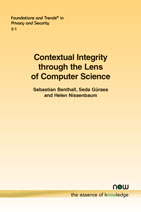Contextual Integrity through the Lens of Computer Science
By Sebastian Benthall, NYU Steinhardt MCC and UC Berkeley School of Information, USA, spb413@nyu.edu | Seda Gürses, FWO/COSIC, KULeuven, Belgium and CITP, Princeton, USA, sguerses@esat.kuleuven.be | Helen Nissenbaum, Cornell Tech and NYU Steinhardt MCCy, USA, hfn1@nyu.edu
Abstract
The theory of Privacy as Contextual Integrity (CI) defines privacy as appropriate information flow according to norms specific to social contexts or spheres. CI has had uptake in different subfields of computer science research. Computer scientists using CI have innovated as they have implemented the theory and blended it with other traditions, such as context-aware computing. This survey examines computer science literature using Contextual Integrity and discovers: (1) the way CI is used depends on the technical architecture of the system being designed, (2) ‘context’ is interpreted variously in this literature, only sometimes consistently with CI, (3) computer scientists do not engage in the normative aspects of CI, instead drawing from their own disciplines to motivate their work, and (4) this work reveals many areas where CI can sharpen or expand to be more actionable to computer scientists. We identify many theoretical gaps in CI exposed by this research and invite computer scientists to continue exploring the horizons of CI.
Contextual Integrity through the Lens of Computer Science
The theory of Privacy as Contextual Integrity (CI) defines privacy as appropriate information flow according to norms specific to social contexts or spheres. CI has had uptake in different subfields of computer science research. Computer scientists using CI have innovated as they have implemented the theory and blended it with other traditions, such as context-aware computing.
Contextual Integrity through the Lens of Computer Science examines computer science literature using Contextual Integrity and discovers: (1) the way CI is used depends on the technical architecture of the system being designed, (2) ‘context’ is interpreted variously in this literature, only sometimes consistently with CI, (3) computer scientists do not engage in the normative aspects of CI, instead drawing from their own disciplines to motivate their work, and (4) this work reveals many areas where CI can sharpen or expand to be more actionable to computer scientists. It identifies many theoretical gaps in CI exposed by this research and invites computer scientists to continue exploring the horizons of CI.
